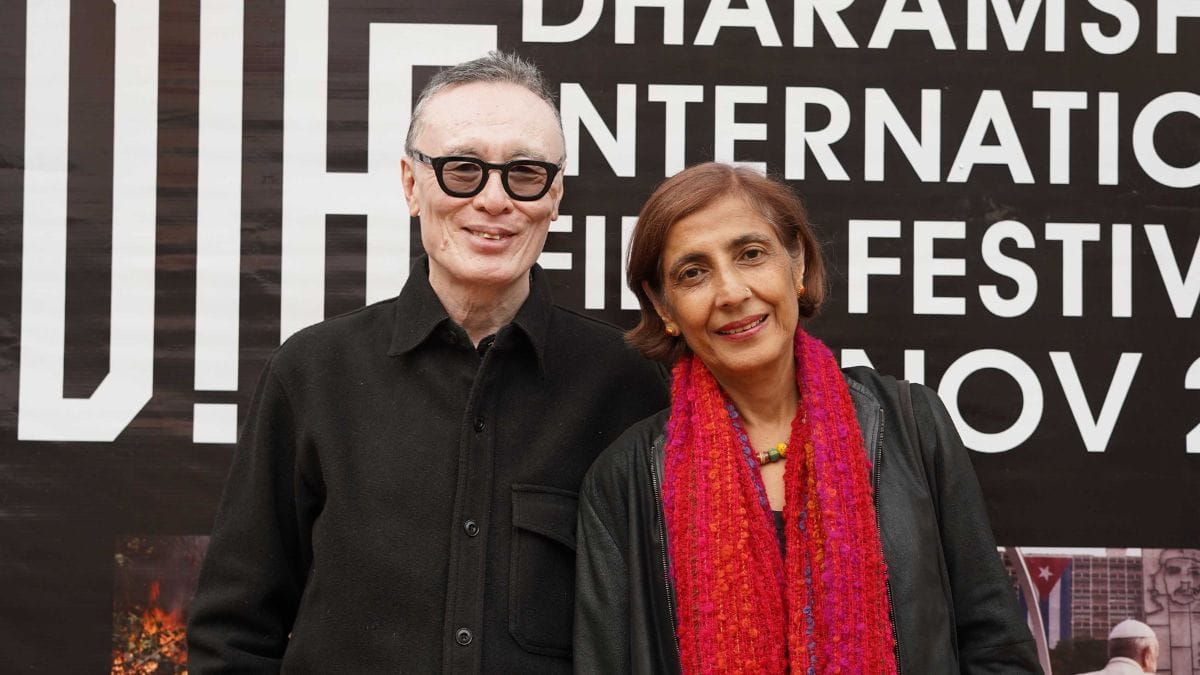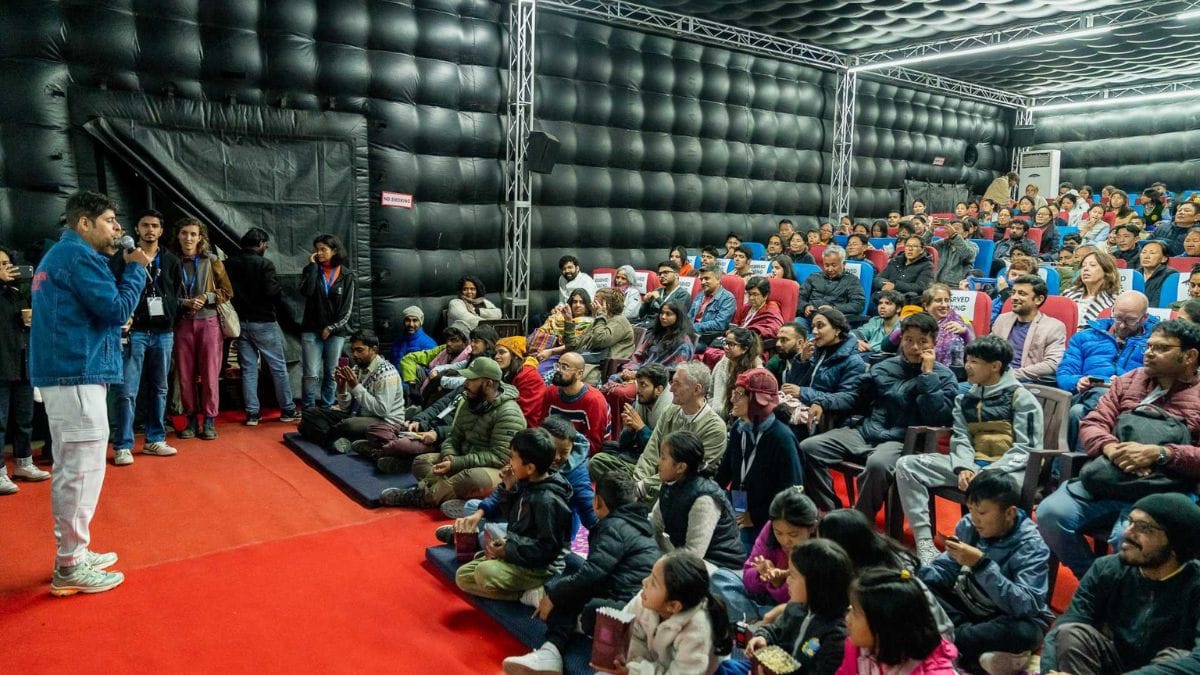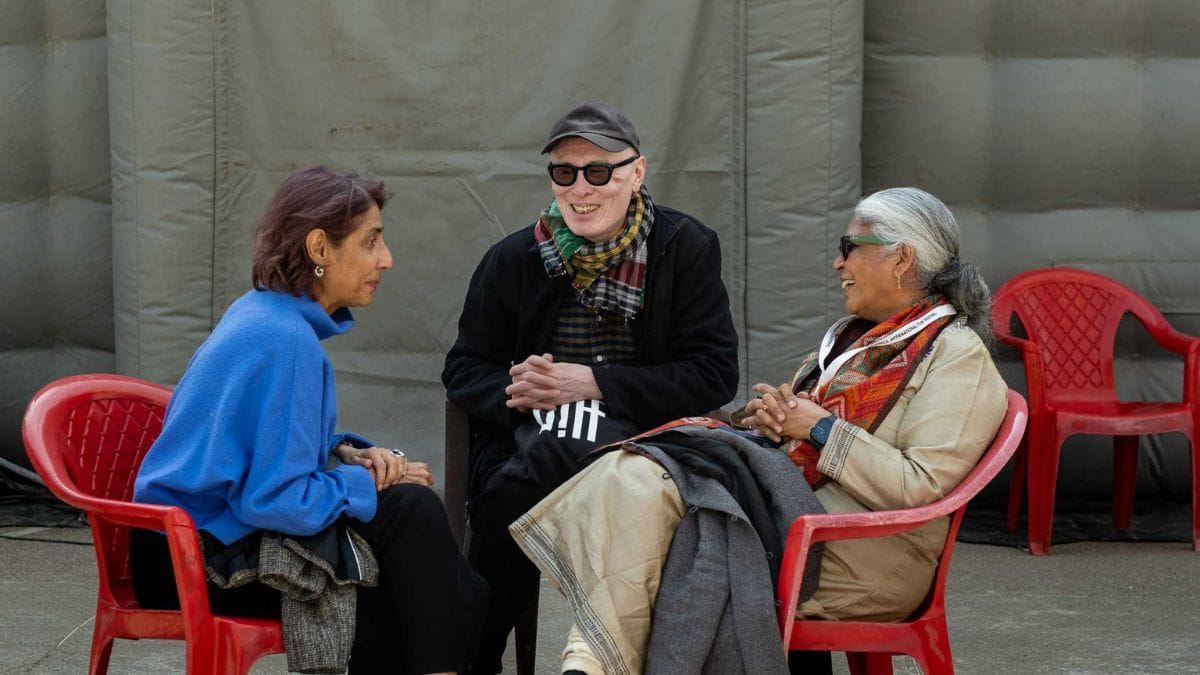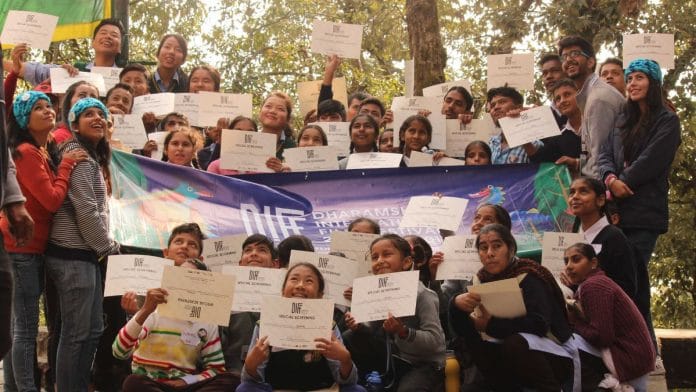New Delhi: Long before Dharamshala became a regular on India’s cricketing calendar—thanks to the world’s highest stadium—a film festival had cinephiles make a beeline for the small town nestled in the Himalayas since 2012.
In the crisp mountain air, against the backdrop of the majestic Dhauladhar mountain range, filmmakers are now holding masterclasses and engaging with audiences through Q&A sessions that form an integral part of the Dharamshala International Film Festival (DIFF). Now in its 14th year, the festival was inaugurated on 30 October and will go on until 2 November at the Tibetan Children’s Village.
And behind North India’s most popular film festival are two visionary filmmakers—Ritu Sarin and Tenzing Sonam, who have made films like The Sweet Requiem (2018) and A Little Cloud (2024).
It started with Sarin and Sonam showing films of friends and colleagues on DVD to the local community 14 years ago. Today, this has transformed into an intimate yet cutting-edge, independent film festival. It uses two dismantlable yet fully equipped theatres.
“I guess in India, there was a gap or need for an indie film festival, and we happened to come in at the right time and filled that gap,” said Sarin.
What started with 16 titles in two theatres has now expanded into screenings held simultaneously in four theatres, and 88 films showcased from all over the globe. This year, the passes sold out a week before the inauguration date, with enquiries still being sent by hopefuls who want to attend the festival.
Initially, Sonam and Sarin would curate the movies showcased in the festival, before opening it up for submissions. “It was then we had a lot of first-time filmmakers send in their entries, especially short films, which have even lesser chances of being shown around to people, and the festival became a platform to showcase these movies,” said Sonam.
DIFF takes accessibility seriously. It provides spaces for filmmakers whose work has faced censorship. Last year, it screened Dibakar Banerjee’s unreleased film, Tees, which was shelved by Netflix. The festival also screened Sandhya Suri’s Santosh, which missed its January 2025 release due to issues with the Central Board of Film Certification (CBFC). This month, the movie was also prevented from being released on OTT platforms.

Sarin and Sonam
DIFF was born out of a vision of making cinema, especially independent films, available to the people of Dharamshala. Single screen theatres had shut down when the festival opened its doors 14 years ago. A multiplex started operations in 2016, five years after the festival started. Without it, there was not much access to watch films in a cinema hall.
DIFF offers a carefully curated mix of Indian and international titles across languages, which mostly don’t find theatrical or even OTT releases.
This year’s festival opened with filmmaker Neeraj Ghaywan’s Homebound, the official selection for the Oscars 2026. It will conclude with Anuparna Roy’s Songs of Forgotten Trees, winner of the Orizzonti Best Director award at Venice 2025.
When Sarin and Sonam were starting out, filmmakers such as Umesh Vinayak Kulkarni, who made Valu (2008) and Vihir (2009), and Asif Kapadia, who made The Sheep Thief (1997), screened their films at the Tibetan Institute of Performing Arts (TIPA), which served as the festival’s venue initially.
“As filmmakers, we have travelled to multiple film festivals. We thought it would be wonderful to have a film festival here, to show contemporary indie films to the local community. We did not set out to become one of the prominent film festivals in India,” said Sarin.
In 1985, Sarin and Sonam worked on their first film together, The New Puritans: The Sikhs of Yuba City, as a joint thesis project. Two years later, they moved to London, where they worked as programme directors at Meridian Trust, a Buddhist and Tibet-related film archive and production company.
As part of Meridian Trust, they documented the Dalai Lama’s historic trips, including his trip to Norway to receive the Nobel Peace Prize in 1989. Two years later, they founded their own company, White Crane Films.
A recurring subject in their work is Tibet. From the installation that documents Tibetan resistance to a film that looks at the lives of Tibetans in exile, Sarin and Sonam have often dealt with Tibetan culture and identity. The film festival is another step in helping the community.
Also read: Maddock is back with a new military true story. Agastya Nanda plays war hero Arun Khetarpal
Branching out
For Sarin and Sonam, it was important to create an ecosystem that could benefit not just cinephiles but members of the local community.
“An important part of building a sustainable ecosystem for independent films to survive is also building the audience for it,” said Sarin. This is why the film festival has also branched out, creating systems to help the process.
The DIFF Film Fellows Programme was established in 2014 to give opportunities to filmmakers from the Himalayan region to receive mentorship sessions from filmmakers such as Anupama Srinivasan, Gurvinder Singh, Hansal Mehta, Kesang Tseten, and Umesh Kulkarni. In 2016, it partnered with Kangra-based organisations to arrange community screenings in villages, schools, colleges, and the District Jail.
“You can watch important indie films in other film festivals too, but because of the intimate setting, you can also interact with the filmmakers. It’s also important to show films that get international acclaim because it gives aspiring filmmakers a glimpse into what’s possible,” said Sarin.
The ‘DIFF on the road’ initiative, started in 2016, became the travelling element of the film festival. It is a year-round initiative through which Sarin and Sonam bring independent films to local audiences and communities beyond their hometown. It features screenings throughout the year across cities, from Delhi to Colombo to Abu Dhabi.
During Covid-19, instead of taking a break, the festival continued online, and when it finally came back in 2022, the response was overwhelming. The audience members now fly down from all over the country.
But as the popularity of the festival grew, Sarin and Sonam had to expand the number of screenings and theatres. That’s when they joined hands with PictureTime, founded by Sushil Chaudhury.
PictureTime Digiplex works on the principle of easy portability and lightweight materials that can be transported to any corner of the country and quickly assembled. The inflatable theatres are equipped with state-of-the-art Dolby digital sound, comfortable pushback chairs, and can be set even at a high altitude of nearly 5,000 feet at Dharamshala.
“We also managed to get the festival a grant too, since we were working with the Ministry of Information and Broadcasting and told them that PictureTime is working with the festival organisers. It started with the team of Picture Time offering infrastructural support to DIFF, and now we are also part of the advisory board,” said Chaudhury. This year too, Chaudhury’s team is working round-the-clock to ensure the attendees get the best sound and visual quality, along with comfortable seats, while being nestled in the mountains.
Thanks to PictureTime handling the technical aspects of screening, Sarin and Sonam could focus on other parts of the festival.

In 2023, the duo handed over the reins of programming to Bina Paul, an award-winning film editor, who has been the artistic director and main driving force behind the International Film Festival of Kerala for more than two decades. The location also shifted from TIPA to the Tibetan Children’s Village, accommodating more people.
Also read: UNESCO opens a virtual museum of stolen artefacts. The goal is to empty it
Impact of DIFF on local community
What makes the festival integral to the location is the festival support group. It comprises an illustrious advisory board featuring Adil Hussain and Guneet Monga, foreign nationals who have made Dharamshala their second home, and young volunteers from all over the country.
With time, the variety of audience that has returned to the festival year after year has also evolved. But at the same time, there is a certain loyalty too that the event has generated.
“I remember a young boy who started attending the festival screenings, and would get his mother along, travelling an hour to reach the venue. He is a grown-up now, but still attends every year. Another is a professor who has been bringing his family here, and this year, he has submitted his own film for screening,” said Sonam.

A Film Appreciation Competition was also introduced to students in the area, helping them learn how to actively and critically engage with cinema.
Sarin and Sonam are in the middle of a couple of hectic days, but are already thinking of the next edition.
This year, the festival received more than 800 volunteer applicants, and 90 were chosen to be part of the organising process, which starts with notification about film submissions in May.
The festival has had a significant impact on the local communities.
“I remember meeting a young woman in Delhi who recognised me and told us how she completed the course as a teenager and won the award while studying at the Tibetan Children’s Village. She mentioned that it gave her a new perspective on what she can do with her life,” said Sonam. The woman also volunteered at the festival last year.
These are the kind of ‘success’ stories that push the two to make sure the show goes on.
(Edited by Prasanna Bachchhav)






